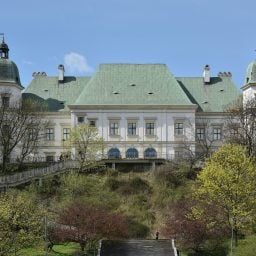At the beginning of the year, a divisive new director assumed the top job at one of Poland’s most internationally renowned institutions, the Ujazdowski Castle Center for Contemporary Art in Warsaw (CCA). His appointment at the state-run museum is at the center of a nationwide battle over who shapes Poland’s cultural institutions, with both sides claiming that they are being silenced. The stakes are high: the dispute has the potential to shape the art shown in Poland and the history taught to the public for decades to come.
When Piotr Bernatowicz’s selection as head of the state-run art center was first announced back in November 2019, the Polish cultural scene reacted strongly and quickly. Petitions and open letters were signed by leading Polish and international cultural figures, with one drawing almost 1,600 names. The Berlin-based Polish artist Agnieszka Polska published a grave op-ed in Frieze magazine, alerting international readers to the fact that “an ultra-conservative, homophobic-platforming curator is set to helm Poland’s leading artistic institution.”
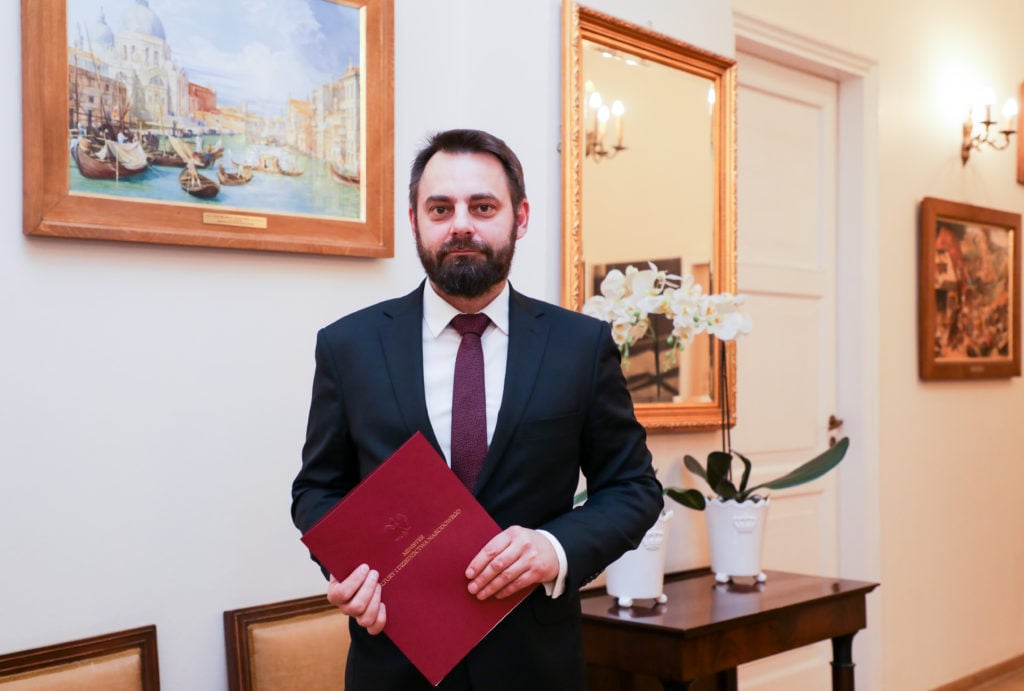
Piotr Bernatowicz, the director of the CCA in Warsaw. Photo: Danuta Matloch
Even the watchdog branch of the International Committee for Museums and Collections of Modern Art published a statement saying that “a key institution for Polish cultural heritage of the post-Cold War era is under threat.”
The arguments against Bernatowicz are twofold. First, with only three years as the director of the municipal gallery Arsenal in Poznań under his belt, he lacks the experience required to run an internationally renowned institution. And then there’s his politics. He is accused of promoting hate speech and offering a platform for revisionist and antisemitic language. During his term in Poznań, Berantowicz organized a group show titled “Strategies of Rebellion,” which featured posters by designer Wojciech Korkuc featuring with slogans including “Women burn faster” and “Gay, don’t faggot the minors.”
In Bernatowicz’s telling, however, he is the subject of a coordinated left-wing art-world campaign that seeks to marginalize any idea it deems unseemly. “I’m currently attacked by the cultural mainstream in Poland,” Bernatowicz wrote in an email to Artnet News. “They accuse me of despising contemporary art. However, what they really object to is my worldview rather than my expertise.”
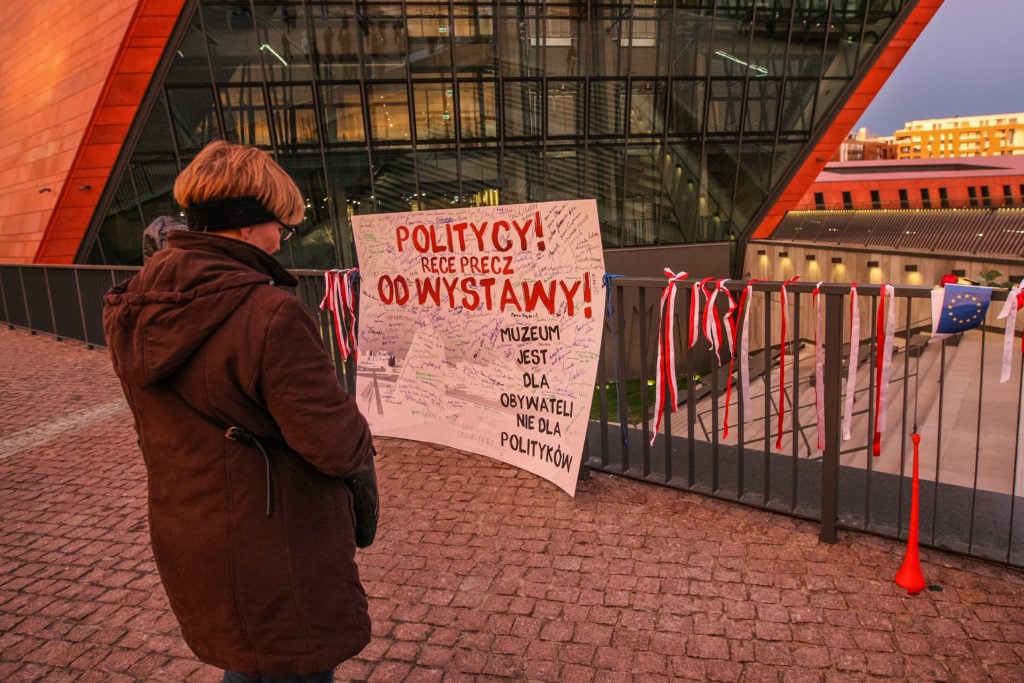
A protester standing in front of a banner that reads “Politicians—Hands off! of the exhibition” in April 2017 in Gdansk, Poland, the same day the Supreme Administrative Court ruled on the de facto liquidation of the World War II Museum and a change in its director. (Photo by Michal Fludra/NurPhoto via Getty Images)
His vision for the CCA, where he will remain for a seven-year term, is to give voice to views that he argues are unpopular in the art world, including “conservative artists, but also those who refuse adopting trendy ideological themes, are kept aside by the curators, and stay on the margins of art institutions.” It remains to be seen how exactly he will apply this agenda; his first program as director is due to be announced in March.
Controversial Appointments
Bernatowicz’s is only the latest in a series of disputed appointments made by the minister of culture, Piotr Gliński, to public museums. Over the past five years, Poland’s art institutions have increasingly become a vehicle for the ruling right-wing Law and Justice party’s (PiS) cultural reform efforts.
When PiS came to power in 2015, it announced its vision for a cultural narrative of commemoration, celebrating Polish heroism, heritage, and folklore. Such focus on the glorification of a country’s history is typical of nationalistic, right-wing movements, and has led to the promotion of alarming revisionist narratives in Poland.
At first, the ministry of culture fired directors whose views it deemed too progressive: Paweł Potoroczyn, who had led the Adam Mickiewicz Institute—which promotes Polish culture abroad—since 2008, was unceremoniously fired in 2016. (He sued the government and won a financial settlement.) The director of the institute’s Berlin branch, Katarzyna Wielga-Skolimowska, was also let go in 2016 for programing that the government criticized as too focused on the Holocaust. Her dismissal, too, drew international attention.
“After a couple such cases, the government realized it’s better to just let contracts expire,” says Magdalena Ziolkowska, curator and former director of the Bunkier Sztuki Gallery of Contemporary Art in Krakow.
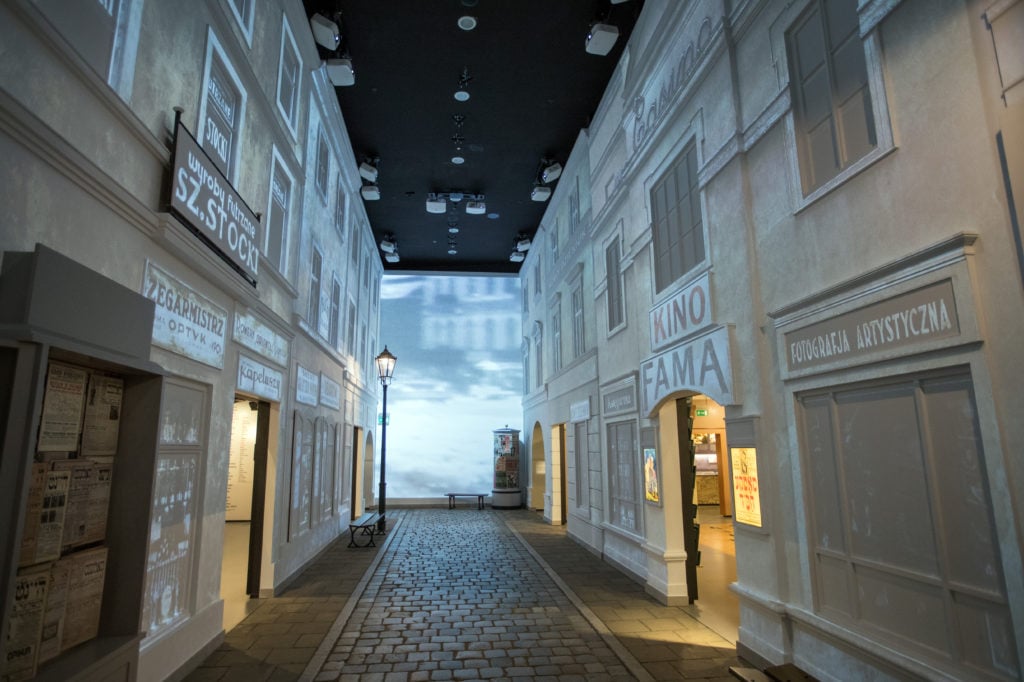
The Polin Museum in Warsaw. Photo: Jens Büttner/dpa-Zentralbild/ZB via Getty Images.
But that strategy is starting to draw opposition, too. In the case of Polin, a museum of Jewish-Polish history in Warsaw, the minister of culture has neglected to formally appoint its chosen director, Dariusz Stola, since last February, even though the institution is a public-private partnership and therefore not entirely controlled by the government.
In an interview with the New Yorker this past September, Stola said, “Every morning, I wake up, have a cup of coffee, and wait for the phone to ring and the minister to tell me he is appointing me because I won the competition.”
On January 30, the city of Warsaw and the Association of the Jewish Historical Institute of Poland came together to demand the government formally allow Stola to begin work. “We can no longer accept the situation in which one of the most important institutions of culture in Poland remains in a state of limbo,” the city’s mayor and the institute’s board chairman said in a joint statement. (A spokeswoman for the culture ministry told the AP that the situation is stable; the acting director’s one-year term expires in late February.)
Public institutions in Poland must hold a competition to appoint directors, with strict regulations regarding the makeup of the jury that reviews applications. But in recent cases, the government simply ignored this mandate: Bernatowicz was appointed without a competition, as was Jerzy Miziolek, who became director of the National Museum in Warsaw last April. Miziolek resigned in December amid a labor dispute, but he will be remembered for his removal of works by three female artists from the museum’s permanent display, including a photographic series by Natalia LL, Consumer Art (1972), that inspired a much-publicized banana-eating demonstrations.
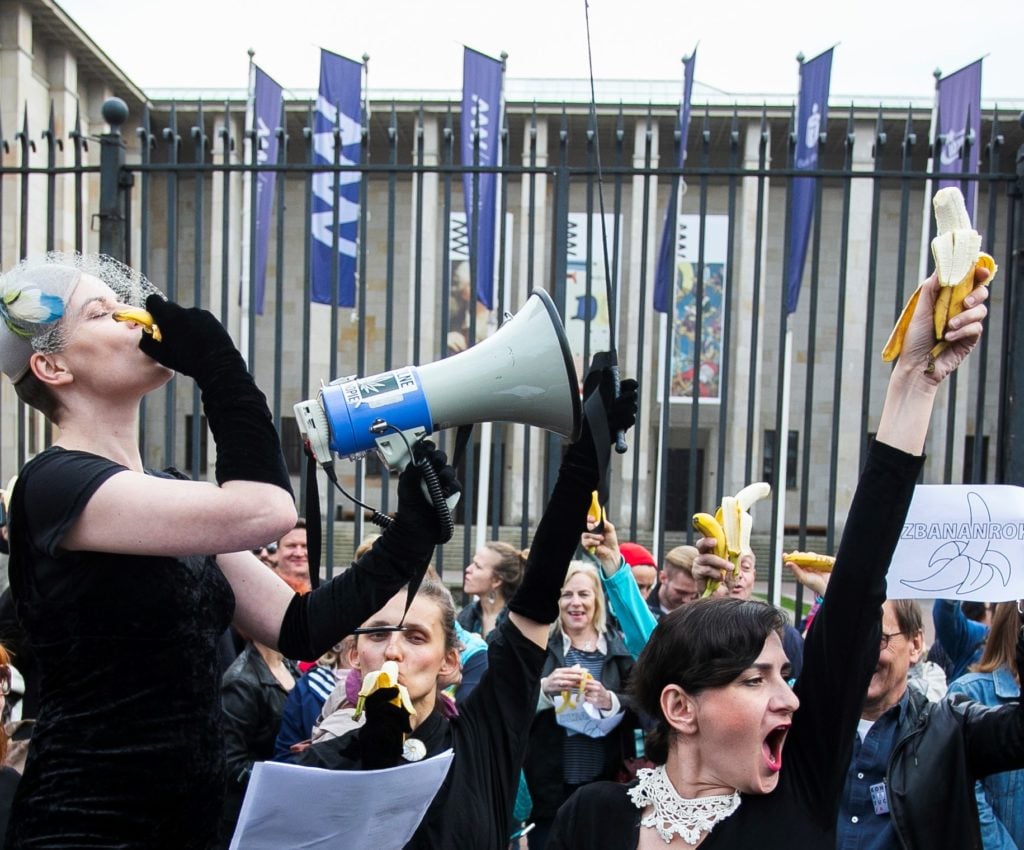
People with bananas demonstrate outside Warsaw’s National Museum. 29 April, 2019, Warsaw, Poland after gallery removes feminist art featuring bananas. Photo by Krystian Dobuszynski, NurPhoto via Getty Images.
A competition to find Miziolek’s replacement has yet to be announced; an interim director, Łukasz Gaweł, is helming the institution for one year. As for the works that were removed, they have not yet been rehung because the galleries dedicated to 20th- and 21st-century art are closed for refurbishment until the fall. “We can’t promise this particular work by Natalia LL will come back on display,” said a museum employee who wished to remain unnamed, “but we have other works by her, which have never been displayed, and definitely her name is on our list.”
The broader dispute over the government’s involvement in staffing was reignited last week, when Alicja Knast, a high-profile museum director who built two major museums in Poland, was fired from her post at the helm of the Silesian Museum in Katowice. She plans to protest her dismissal in court.
A Fight Over the Future
However, it’s not only the right-wing politicians who are interfering with appointments. In 2017, Bernatowicz won the competition for a second term at the Arsenal gallery in Poznań, where he had worked since 2014, “but the mayor refused appointing me due to political reasons,” he told Artnet News.
Marek Wasilewski, who took over Arsenal instead, confirmed that he had come in second, winning one fewer vote than Bernatowicz. “It’s the prerogative of the mayor of the city whether or not to accept the jury’s recommendation,” he explained. “Bernatowicz wanted to show artists who were not shown enough in his opinion, meaning he wasn’t giving the audience in the city the opportunity to see what’s happening in contemporary art. The mayor preferred my proposal.” (As Arsenal is a municipal gallery, rather than a state-run institution, the mayor had the power to overrule the decision.)
The mayor’s priority, Wasilewski added, was to keep the museum engaged with its peers and with the international cultural sector. “After Bernatowicz took over, Arsenal isolated itself in many aspects from the network of cooperations between different institutions,” Wasilewski pointed out, “and the educational program was very limited.”
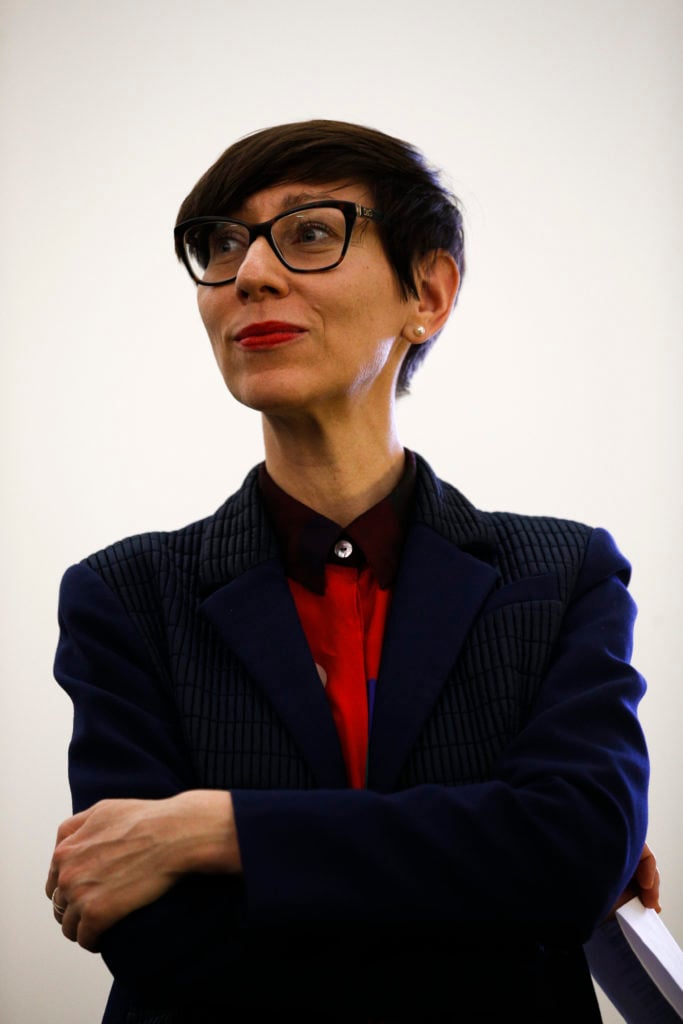
The former director of the Center for Contemporary Art Ujazdowski Castle, Malgorzata Ludwisiak, at the opening of the third edition of the Night of Ideas in Warsaw on January 31, 2019. (Photo by Jaap Arriens/NurPhoto via Getty Images)
A descent into isolation and irrelevance is exactly what the Polish art world fears would become the CCA’s fate—a loss for a cutting-edge institution that, since the 1990s, has established itself as a reliable partner in an international network. This year, for example, shows already scheduled by the outgoing director include collaborations with the Kiasma Museum in Helsinki and the KW Institute in Berlin.
“What we were trying to do during my five-year directorship was to professionalize and internationalize the CCA, looking for the most contemporary discourses in the art field,” said Malgorzata Ludwisiak, whose contract as director was not extended by the government at the end of 2019.
At the beginning of the year, Ludwisiak began a two-year term as a member of the content committee for the International Committee for Museums and Collections of Modern Art, which is tasked with shaping the agenda for CIMAM’s annual conference addressing pressing issues facing contemporary art museums worldwide. This fall, for the first time since the 1960s, CIMAM is holding its international conference in Poland; dozens of museum leaders will gather in the cities of Łódź and Gdańsk to discuss the state of the field. But the divisive state of affairs within Poland’s own museums could become the elephant in the room.
“We’re now starting to discuss to what extent and by which means would the conference address the situation in Poland,” Ludwisiak told Artnet News. “You can’t ignore the specific local context within which the conference is happening.”










